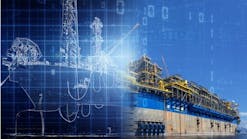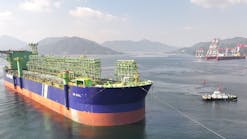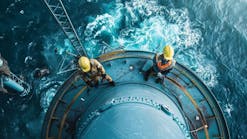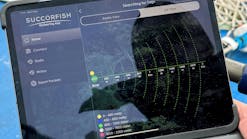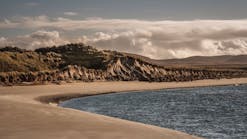Jeremy Beckman
Editor, Europe
EVOLEN is the association representing the interests of 220 companies and 1,100 individuals across France’s oil and gas sector, from exploration, production, development and logistics to refining and distribution. Christophe Remoue, who has worked at Total on various major projects, including Egina and Ofon offshore Nigeria, was seconded by the company last June to serve as EVOLEN’s General Manager.Offshore sought his views on the current state of the industry in France and its future prospects.
Offshore: Is the association’s new name, introduced last year, now widely known?
Remoue: I believe it is and we are working very hard to promote our reputation. We had a history as GEP-AFTP but over the last three years the industry went through a very hard downturn. Everything now is changing, with a much greater emphasis on environmental issues – hence the new title, EVOLEN.
Christophe Remoue. (Courtesy EVOLEN)
The association’s aim is to work worldwide, and we will expand our network of representatives to do this. In certain cases we anticipate collaborations with counterpart organizations in other countries, such as NORWEP in Norway: they were created to serve the interests of Norwegian companies in oil and gas, and now also cover renewable energy. We are already exchanging ideas and plan joint activities, starting with a symposium later this year in Paris.
Fundamentally, it doesn’t make sense to work alone in a downturn, whether you are a company or an organization. You need to seek help, pool resources, and this could mean joint presentations in oil and gas trade shows in the future.
Offshore: Have the French oil and gas contractors, service companies and supply chain fully adapted to the new business environment, following the recent downturn?
Remoue: It was very violent: in one year the industry’s revenue was cut by one half, and there was also a strong impact on employment. However, we think the recovery is finally under way, and this was supported by the findings of a recent Barclays Bank presentation in Paris on Upstream Spending. The situation has changed, with the emphasis on costs and shorter project timeframes. But we do see opportunities for our member companies both in the shorter and longer term. All the information points to the risk of an oil supply shortfall by 2021-22, so the industry has to launch more projects.
The French supply chain, as elsewhere, has to continue adapting and working on costs. There has been a lot of merger and acquisition activity and that looks set to continue. However, we are still in a recovery period: there are opportunities, but not everywhere, and we need to seek out these opportunities.
One way EVOLEN helps its members access emerging markets is through trade missions: West Africa is one of our focus areas, in particular Mauritania, Senegal, Côte d’Ivoire, Ghana, and Nigeria. South America is another region of interest. This year, we took a group to Argentina, where the main growth market at present is onshore unconventionals, although Total is also active in offshore gas development in the south of the country. Our members met with representatives of the Ministry of Energy, YPF, Total, Pananemrican Energy, Oilstone Energia, Wintershall Energia and Pampa Energia. In Brazil we will try to leverage the recently ratified E&P and R&D agreement between Petrobras and Total. Petrobras has a huge program of developments ahead, and a requirement for a wide spectrum of capabilities that French companies can respond to.
Offshore: EVOLEN has staged various technical conferences in Paris over the past few months with topical offshore themes such as decommissioning and gas hydrates. Have these been well received by the members?
Remoue: We have changed the content of our conferences to reflect not just emerging technological, but also economical and political developments. Attendance has been strong because the companies are looking for opportunities and need to be aware of the trends, markets and technical issues. These events also provide openings for networking. We plan to put on more such events and extend these to other parts of France and elsewhere, including exhibitions such as OTC, and via our trade missions.
Offshore: Can you provide an update on the association’s initiatives on digitization and attracting new engineering graduates to the sector?
Remoue:Digitization is the future of our industry, and education is a major issue for the oil and gas industry, also attracting skilled people. The industry has always been cyclical, going through good and bad times, with companies shedding staff during a downturn, followed by a recovery and a skills shortage. But this downturn has been different, with a lot of our companies developing solutions to somehow keep hold of their workforce. Total’s President and CEO Patrick Pouyanné was very firm that the company would not fire anyone, being mindful that the recovery would eventually come.
Others have retained and paid their staff, even while they remained at home, because retention of skilled workers has become very challenging, and in 2021-22, they will be needed for the upsurge in field development projects. However, the main problem today for our industry is not to recruit but to attract, and that is something we have to work on. Digitization helps, because it shows our sector in a different way to new graduate engineers – if you are a specialist in Big Data, AI or mathematics, you can find a job in our industry, as there is an increasing need for these technologies and disciplines.
Offshore: Is the association still helping those oil and gas individuals in France that were made redundant to re-train for careers in other sectors?
Remoue: It is still an issue because we remain in a recovery period. Although some companies are doing better, others still need to release or adjust their workforce, and there are a lot of people who lost their jobs still seeking employment.
Offshore: What is the status of the association’s OG2P value partnering platform?
Remoue: This is a web-based platform, due to be launched later in the year, that will connect people and companies to address issues in countries where there are special local content regulations or requirements. So for example, if your company is in Nigeria or Brazil, and you are looking for a partner to bid for a job, or to co-develop technology, you can apply to OG2P and find a relevant French supplier or contractor who also wishes to work in one of those countries. We then provide a matchmaking service. The same process applies to the French company looking for a complementary partner in a bid. We have three people managing this system, and sometimes our member companies who are already familiar with the local content situation are willing to provide assistance.


